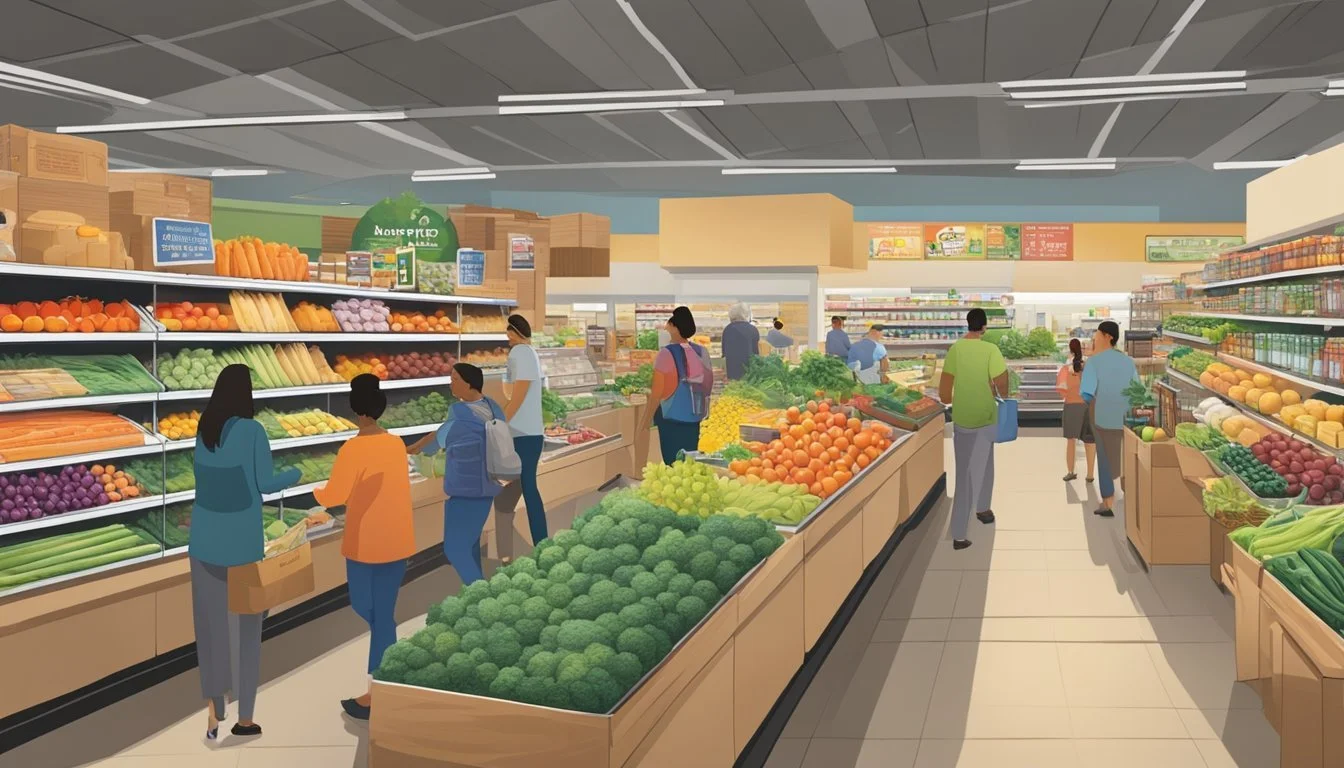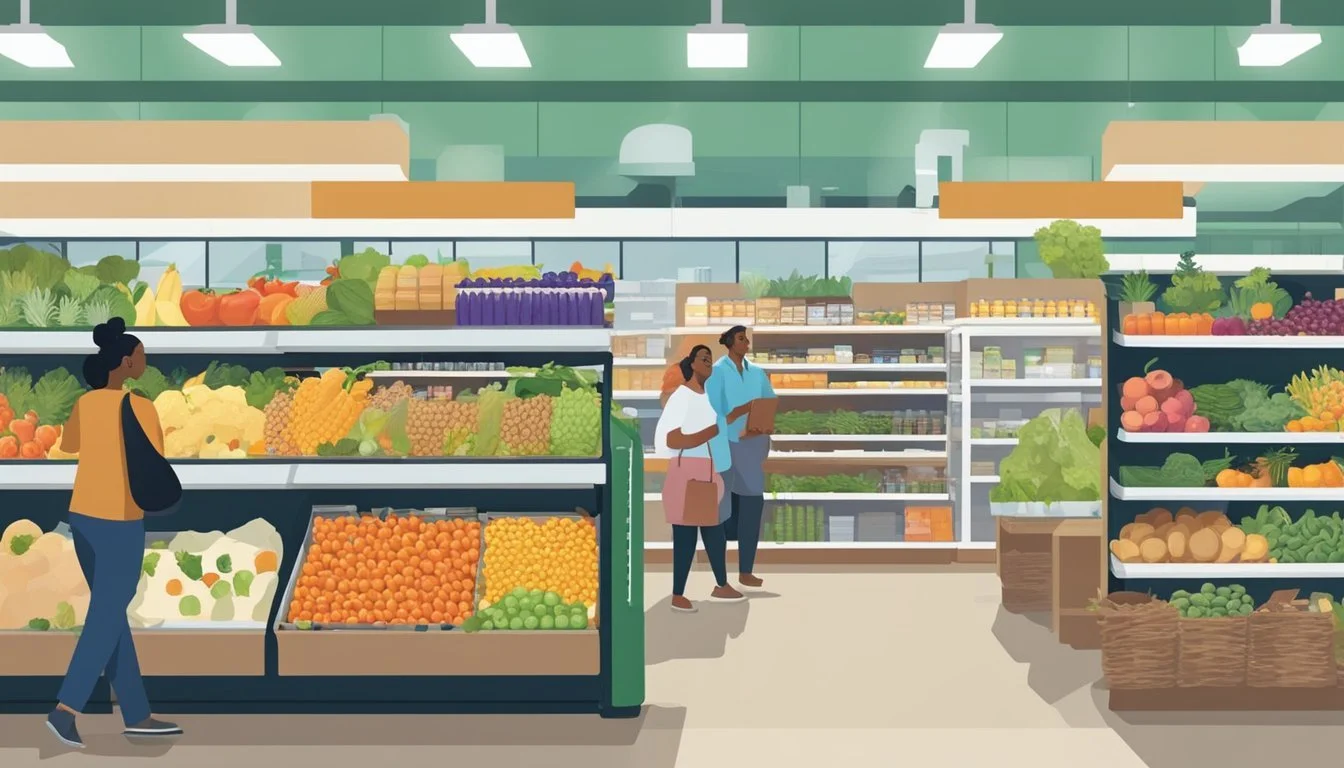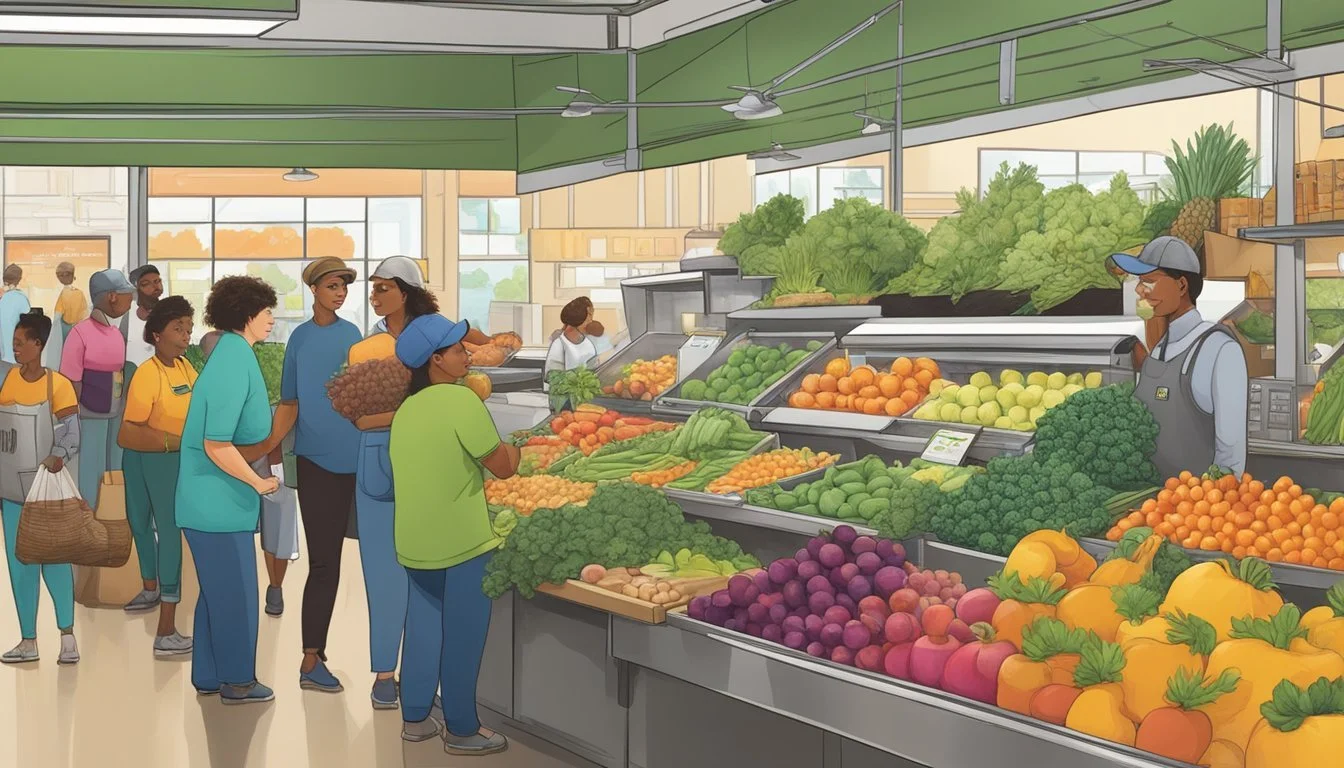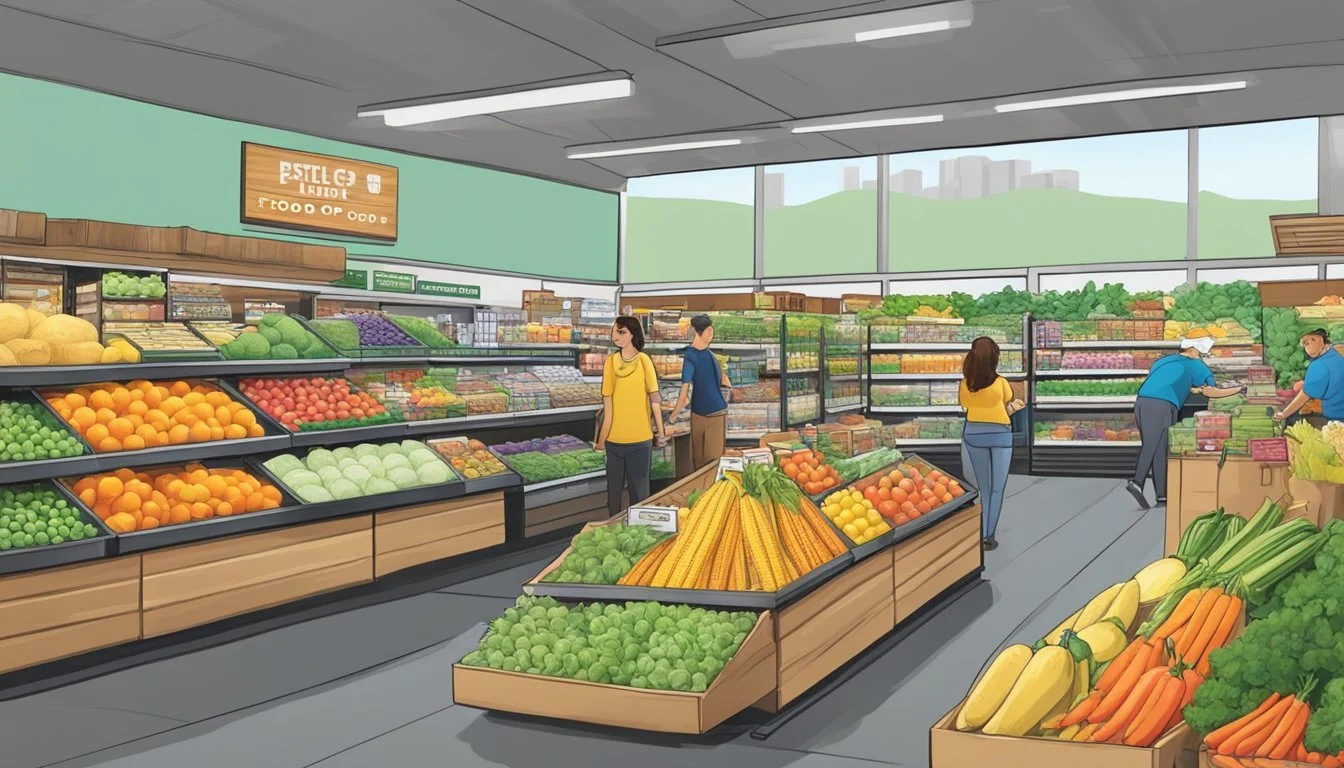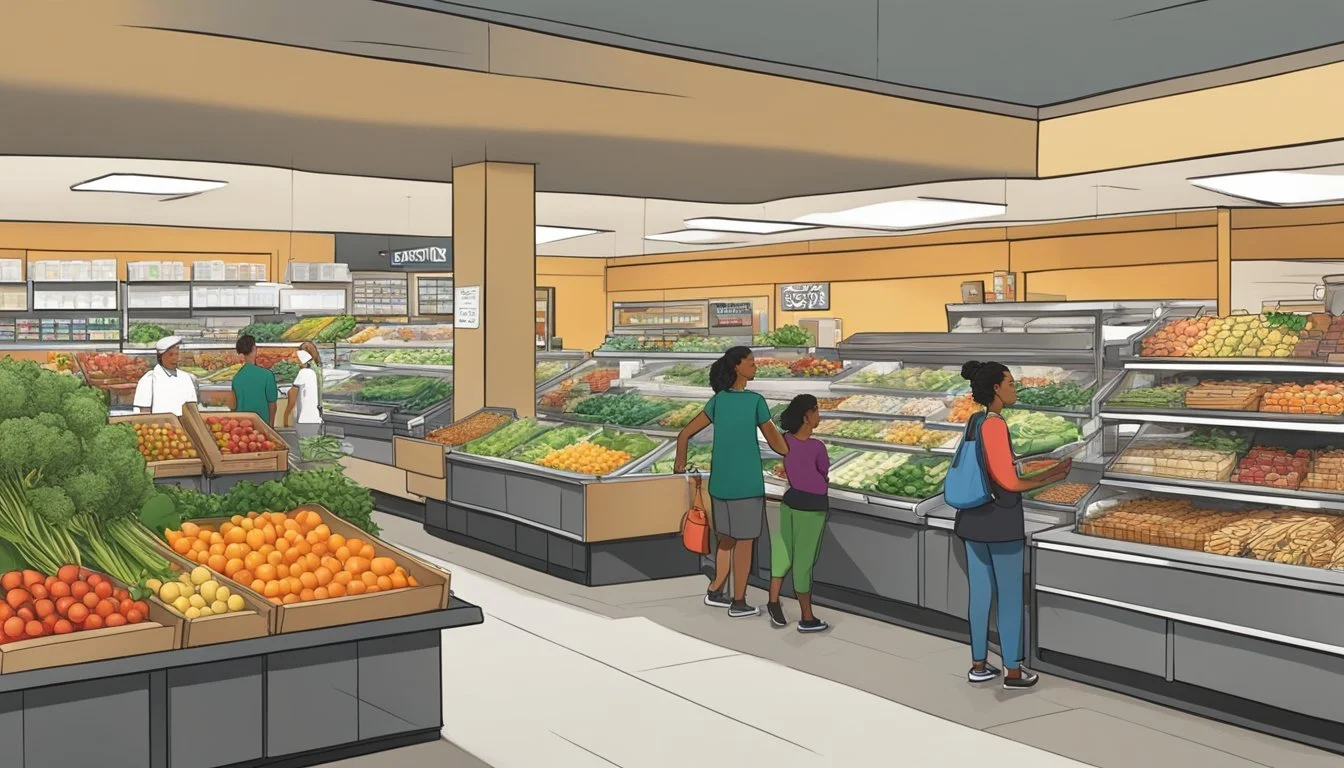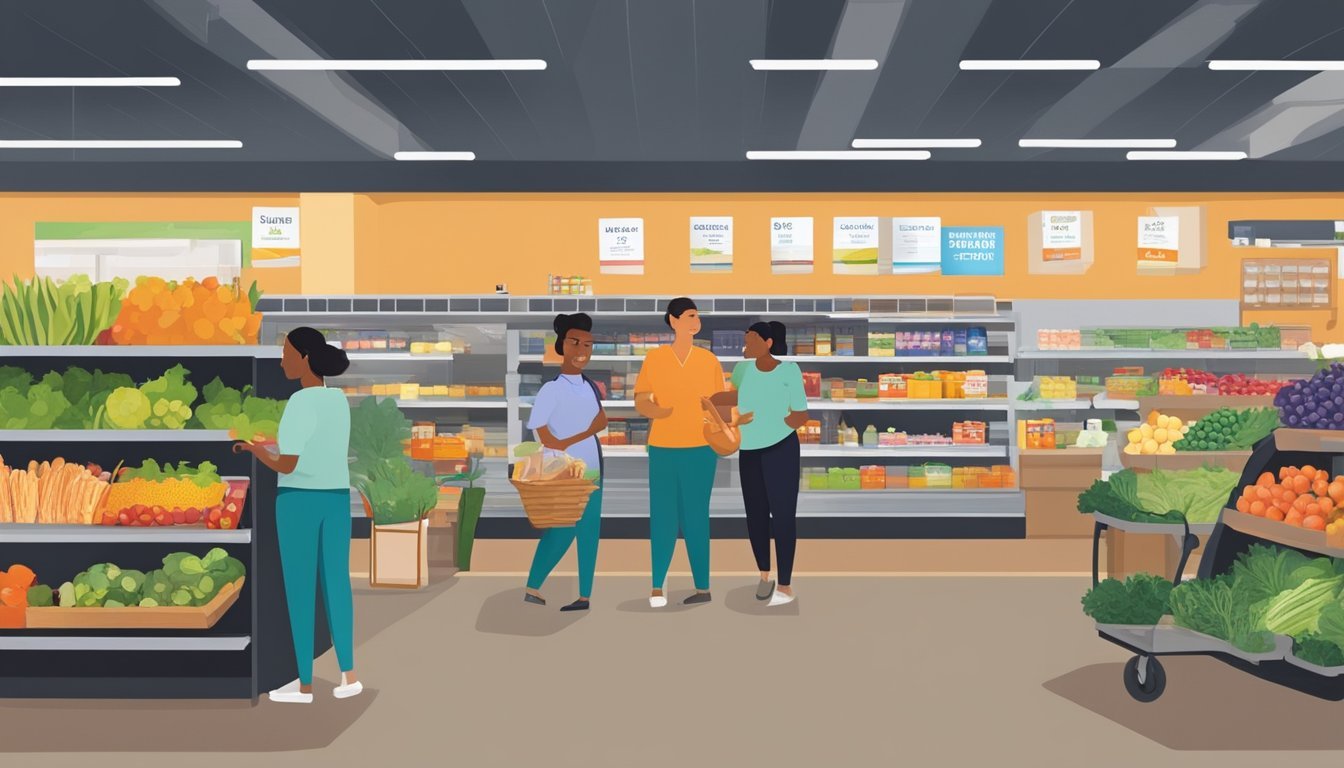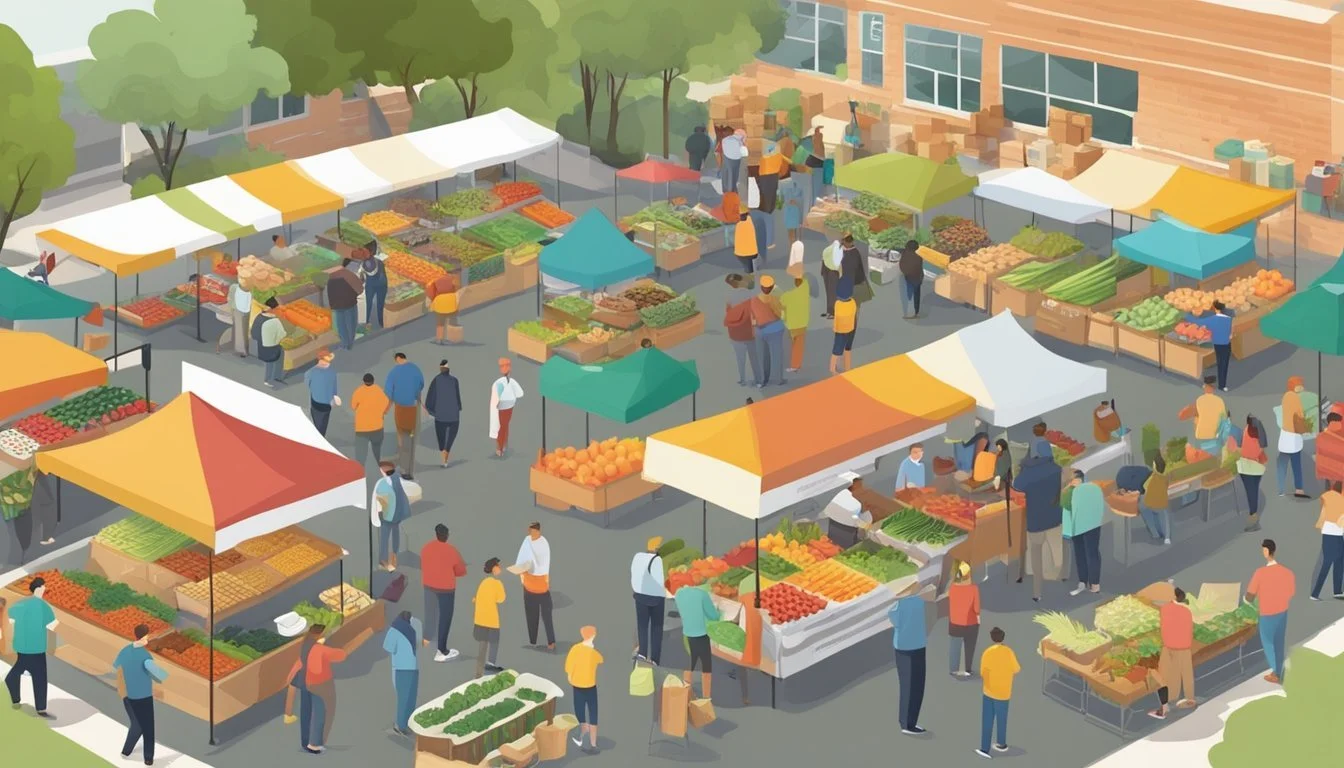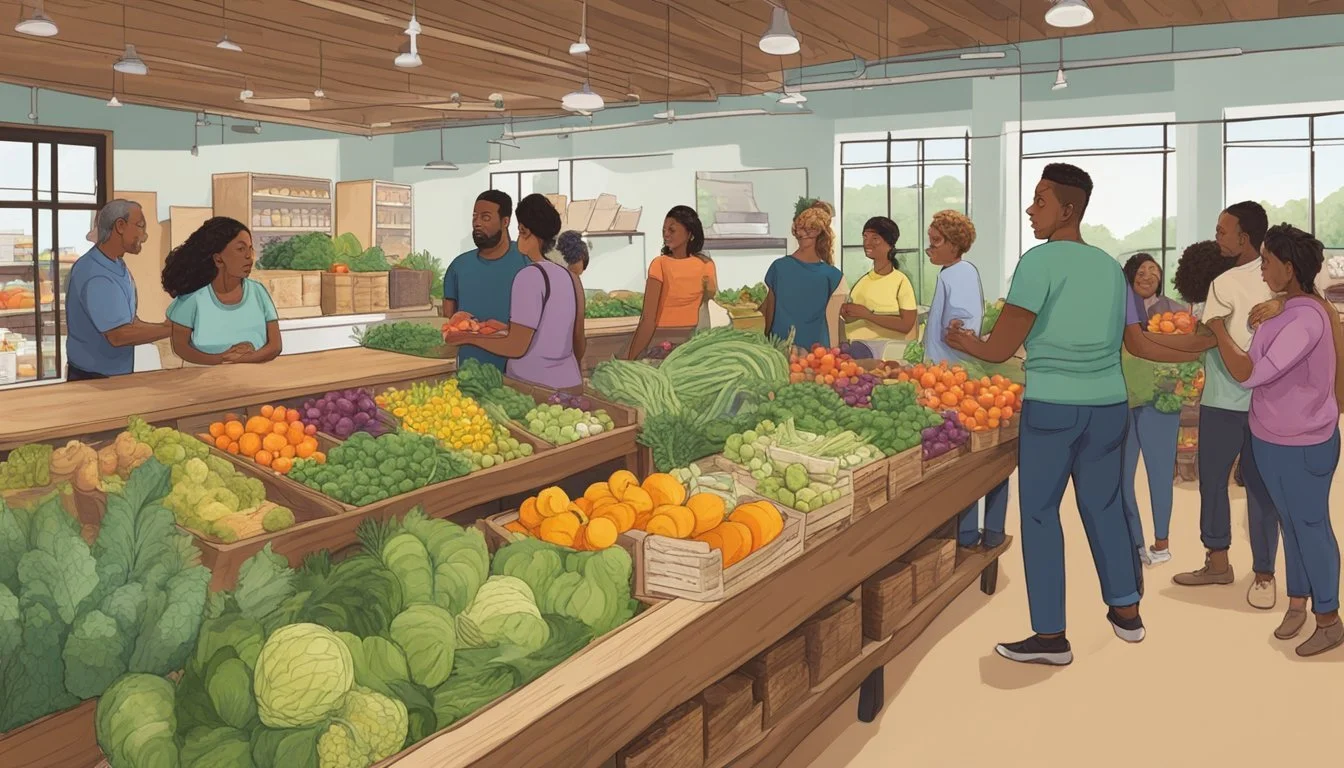Guide to Food Co-Ops in Richardson, TX
Your Essential Resource
Food cooperatives, or food co-ops, present a unique alternative to mainstream grocery stores, fusing community-centric values with access to fresh, locally-sourced products. In Richardson, Texas, these community-led organizations have become a cornerstone for residents seeking not only to purchase healthy and clean meat but also to invest in their local food system. They offer a variety of products often directly from local farms, including 100% grass-fed and pastured meats, organic produce, and locally crafted goods.
Catering to the eclectic tastes and dietary needs of Richardson's diverse population, these cooperative ventures are more than retail outlets; they serve as hubs of food education and social connection that can benefit both local consumers and producers. With the resurgence of interest in where food comes from and how it's produced, Richardson's co-ops are meeting the demand for transparency and quality. They provide an avenue for families and individuals alike to combine orders for organic fruits and vegetables, raw dairy, pasteurized chicken and eggs, and grass-fed meats, supporting sustainable farming practices in the region. These establishments not only empower consumers through shared purchasing power but also foster deeper connections between the community and local food producers.
Understanding Food Co-Ops
Food cooperatives offer community-owned grocery options emphasizing healthy, organic, and locally sourced products. They operate on principles that prioritize consumer education, member control, and community support.
Defining a Food Co-Op
A food co-op is a retail establishment operated by a collective of members who jointly own and democratically control the business. It focuses on providing healthy food options to its members and the wider community, often including organic and natural foods. Members of a food co-op have a say in the operations, and profits are often reinvested into the cooperative or shared among members.
Ownership: Community-owned
Product Focus: Healthy, organic, and natural foods
Member Involvement: High degree of control and decision-making
History and Philosophy of the Food Co-Op Movement
The food cooperative movement traces its roots back to groups of consumers interested in purchasing quality food at fair prices while maintaining a sense of community. This movement aligns with a philosophy that values education, community-oriented goals, and sustainable, ethical sourcing. Food co-ops empower local communities to affect positive change in the food system.
Historical Roots: Began with people seeking better food prices and quality
Key Philosophy: Consumer education, ethical food sourcing, community empowerment
Community Impact: Supports local economies and provides education on food-related issues
Benefits of Joining a Food Co-Op
Joining a food co-op yields numerous advantages spanning health, economy, and community. Members have access to high-quality, nourishing foods and collectively support sustainable local economies and environmental practices.
Health and Nutrition
Food co-ops are treasure troves of organic produce, offering a variety of healthy options including organic fruits and vegetables. They often prioritize:
Real Food: A strong focus on minimally processed and natural food items.
Healthy and Clean Meat: Availability of meats that are not only 100% grass fed but also raised with humane practices.
Economic Advantages
Food co-ops operate on a business model that benefits the local economy by:
Supporting Local Farmers: Direct patronage to local food producers, often resulting in fresher, more flavorful produce.
Patronage Refunds: Financial returns to members based on the co-op's profit and individual member's purchases.
Community Impact
The local community thrives when individuals choose to join a food co-op due to:
Local Food: By advocating for and selling local food, co-ops help sustain the local food system.
Environmental Impact: Co-ops often have strong environmental policies, nurturing a healthier planet through eco-friendly practices.
Guide to Richardson's Co-Ops
Richardson, Texas boasts a thriving community-focused food scene that includes a variety of food co-ops. These co-ops support local farmers, ranchers, and artisan food producers, offering residents access to fresh, sustainably sourced produce and goods.
Local Food Co-Ops
Off the Farm Food in neighboring Lewisville, which is approximately 20 miles from Richardson, is a key player in the local co-op landscape. Since its inception in 2013, it has been committed to bringing "healthy and clean meat" to the community. They emphasize sourcing 100% grass-fed and pastured meats directly from local farms.
Richardson Farm Co-Op: Positioned to serve the North Texas suburban family, this co-op connects consumers with small farms and purveyors from the Richardson area, reaching as far as South Africa. The Richardson Farm Co-Op operates on a bi-weekly ordering system, allowing customers to plan and purchase a variety of items.
Products offered: Prepared/Packaged Foods, Fruits & Veggies, Honey & Elixirs.
Ordering schedule: Every other Friday through Monday.
Specialty Co-Op Offerings
Apart from traditional produce and meat products, Richardson's food co-ops often feature goods from local artisans. This includes artisan bakeries, craft breweries, wineries, and farm to table restaurants that enrich the food landscape. Here's what to look for in local co-op offerings:
Artisan Bakeries: Freshly baked bread and pastries from local grains and traditional techniques.
Craft Breweries: Unique, locally brewed beers with a range of flavors and styles.
Wineries: Local vineyards contributing to the co-ops with Texas-grown wines.
Farm to Table Restaurants: Establishments featuring menus that adapt based on seasonal availability of produce directly from local farms.
Purchasing from Richardson's co-ops not only supports the local economy but also promotes sustainable practices by reducing the carbon footprint associated with long-distance food transportation.
Membership and Participation
Food co-ops in Richardson, TX, offer community members the opportunity to access fresh, locally-sourced produce, dairy, and other goods. Through a membership model, individuals can become part of co-ops, enjoying benefits such as discounts and shared decision-making, while also adhering to certain responsibilities like participation in co-op governance or volunteering.
How to Join
To become a member of Richardson food co-ops, individuals typically pay an annual membership fee. For example, some co-ops may charge a one-time co-op fee and then an annual renewal. Co-ops may offer various levels of membership such as full, half, or mini shares based on household size. Prospective members may need to:
Submit an application: Provide personal details and choose the type of membership.
Pay membership fees: These could be a flat fee or vary according to the membership tier.
Orientation: Some co-ops require new members to attend an orientation session.
Member Benefits and Responsibilities
Members of Richardson food co-ops can enjoy several benefits. They typically receive:
Discounts on produce and other supermarket items.
Access to wholesale prices, substantially saving over time.
Availability of products catering to special diets and preferences.
In return, members have certain responsibilities:
Active participation in co-op governance, which may include voting on critical issues.
Some co-ops require volunteer hours—members contribute time towards the co-op's operations.
They must adhere to the co-op's guidelines, promoting convenience and efficiency for all members.
Membership in a food co-op isn't merely a consumer choice; it's a commitment to support and sustain a community-oriented food system.
Shopping at a Food Co-Op
When shopping at a Richardson food co-op, one can expect to find a variety of locally sourced, high-quality foods. They provided a unique market experience with an emphasis on fresh, organic produce and grass-fed meats.
What to Expect
Food co-ops in Richardson typically offer a selection of goods that cater to health-conscious and gourmet shoppers. Customers will likely encounter grass-fed beef, free-range poultry, and pastured pork. Additionally, one may find local raw honey and fresh seafood such as Alaskan Sockeye salmon. These co-ops are more than just grocery stores; they operate on a membership model, which means shoppers are also part-owners of the co-op.
Produce: Expect an abundance of organic and locally-sourced fruits and vegetables.
Meat and Seafood: Grass-fed beef and fresh seafood options are prominent.
Dairy and Eggs: Items like raw whole milk and free-range eggs are available.
Packaged Foods: Local dry goods and often gluten-free options can be found.
Finding the Best Deals
To find the best deals in a food co-op, it's essential to understand the membership structure. Members typically receive discounts on products and may have access to special sales. Bulk purchasing is a common practice in co-ops that can result in significant savings, particularly for non-perishable items.
Membership Discounts: Look for price reductions available exclusively to co-op members.
Bulk Buying: Save money by purchasing larger quantities of staples like grains, spices, and dry goods.
Seasonal Sales: Keep an eye out for discounts on produce that is in season.
Joining a food co-op in Richardson allows shoppers to contribute to a sustainable local food system while enjoying high-quality products at competitive prices.
Supporting Local Agriculture
Richardson, Texas, is a burgeoning hub for food co-ops and initiatives that support local agriculture. Through direct connections with local farmers and a focus on sustainability, these efforts are making a tangible impact on the local economy and environment.
Building Connections with Local Producers
Local food co-ops in Richardson facilitate relationships between consumers and local producers. Food co-ops like Off the Farm Food act as intermediaries, bringing 100% grass-fed and pastured meats directly from farms to the community. These meats, which include grass-finished beef, are sourced from local farms dedicated to ethical animal raising practices.
Local Entrepreneurs play a crucial role by partnering with these food co-ops. They offer fresh farm-to-table options, including food trucks that serve locally sourced dishes. Their participation not only provides fresher alternatives to the residents but also gives local farmers a dependable outlet for their products.
Impact on Local Economy and Environment
Food co-ops contribute significantly to Richardson's economy:
Local Spending: Dollars spent at food co-ops circulate within the community, bolstering the economic health of the area.
Job Creation: These co-ops and related businesses, such as farm-to-table food trucks, create jobs for local residents.
From an environmental standpoint:
Sustainability: By preferring pastured meats and 100% grass-fed beef, these co-ops support farming methods that are more environmentally sustainable.
Reduced Carbon Footprint: Local sourcing reduces the carbon footprint compared to the long-distance transportation of food items.
Through their dedication to local sourcing and sustainability, Richardson's food co-ops are integral to a thriving local food ecosystem.
Educational Programs and Resources
Food co-ops in Richardson, TX, serve as pivotal centers for education and community engagement, focusing on the promotion of healthy, sustainable lifestyles. They offer a variety of educational programs and resources aimed at spreading knowledge about healthy food, organic vegetables, and the benefits of a networked community.
Workshops and Events
Co-ops regularly host workshops and events that educate the public on a range of topics, from organic food cultivation to nutritious cooking techniques. These gatherings are designed for individuals of all skill levels, from novices just beginning their journey towards healthier living to seasoned experts in sustainable practices. Sessions might cover:
Organic Gardening: Cultivating organic vegetables and understanding sustainable farming practices.
Cooking Demonstrations: Preparing healthy food options with local, seasonal ingredients.
These workshops are often led by experts in their respective fields, providing attendees with reliable and actionable information.
Co-Op as a Resource for Healthy Living
Co-ops act as a valuable resource for those interested in making a shift towards a healthy lifestyle. They not only provide access to fresh, organic produce but also share knowledge on the nutritional benefits of consuming such foods. Members and non-members alike can take advantage of:
Informational Resources: Guides on the selection and benefits of organic produce.
Networking Opportunities: Building relationships with local farmers, nutritionists, and fellow health-conscious individuals.
By participating in a co-op’s offerings, people gain insights into maintaining and enhancing their health through better dietary choices. Co-ops foster a community-focused environment where education and resource sharing encourage members to adopt a more health-conscious approach to eating.
Direct from the Farm
Richardson, TX, offers a gateway to fresh, locally-sourced food through a variety of food co-ops. These co-ops provide residents with direct access to grass-fed beef, pastured chicken and pork, dairy products, and eggs, all while prioritizing the absence of pesticides, chemicals, and GMOs.
Understanding Farm to Co-Op Processes
When analyzing farm to co-op processes, one must recognize that stringent measures are in place to ensure the integrity of the food. Entities like Off the Farm Food have been instrumental in connecting consumers with clean meat and dairy products directly from local farms. They emphasize meat that is 100% grass-fed and pastured, ensuring a high-quality diet for the animals which translates to nutrient-rich food for consumers.
Product Sourcing: Food co-ops like those found near Richardson typically source their products directly from farms that adhere to strict animal welfare and sustainable agricultural practices.
Food Quality: The co-ops commit to providing food that is free of unnecessary additives, with a focus on natural growing methods.
Quality and Sources of Products
The quality of products available at local co-ops is directly linked to the sources from which they are procured.
Grass-Fed Beef: This beef is sourced from animals that have been fed a natural diet of grass, which can lead to leaner cuts and can be richer in certain nutrients.
Pastured Chicken and Pork: These meats come from animals raised on pastures, allowing them to roam freely and live more natural, healthy lives.
Dairy Products and Eggs: Local co-ops offer dairy and eggs from farms where animals are not exposed to hormones or antibiotics, prioritizing animal health and product purity.
Local co-ops ensure that their offerings are free from chemicals and pesticides, and that the meats provided are as clean and natural as possible. The emphasis on quality showcases a commitment to health and the environment that resonates well with the Richardson community.
Co-Op's Role in the Food System
Food co-operatives, or co-ops, in Richardson, TX, play a pivotal role in reshaping the local food system toward sustainability and ethical consumerism. They support sustainable farming methods, facilitate farm to fork initiatives, and ensure fair trade products are accessible at a fair price. Co-ops are also a platform to introduce and distribute lacto-fermented foods, bringing both health benefits and variety to the community.
Championing Sustainable Practices
Food co-ops are committed to sustainable farming practices, which includes the promotion of organic produce, non-GMO items, and local farming partnerships. By favoring farm to fork approaches, these co-ops help to reduce carbon emissions due to shorter transport distances for food. In Richardson, they actively:
Support local farms that employ chemical-free farming methods.
Provide educational resources on the environmental benefits of sustainable farming.
Through these actions, co-ops contribute to a healthier ecosystem and increase the availability of fresh, local produce.
Promoting Fair Trade and Ethical Sourcing
Fair trade products play a significant role in co-ops, ensuring that farmers and producers receive a fair price for their goods. Ethical sourcing is prioritized to:
Uphold fair labor practices.
Encourage environmental stewardship in production methods.
Consumers at Richardson co-ops can trust that their purchase supports a system that values the well-being of workers and the planet. Additionally, co-ops often offer a range of lacto-fermented foods, known for their probiotic qualities, sourced from fair trade suppliers whenever possible.
Community and Social Aspects
Food co-ops in Richardson, TX are not just about buying food. They are centers for community engagement and collaboration, offering residents the chance to be part of a supportive network while participating in various social events.
Building a Supportive Network
In Richardson, local food cooperatives serve as hubs for fostering a tight-knit community network. Organizations like Your Health Source and Urban Acres connect individuals with an interest in healthy living and sustainable practices. These networks are often fortified through Facebook groups and other social media platforms, allowing members to communicate, share tips, and offer support beyond the physical location of the co-ops.
Social Events and Gatherings
Community events and gatherings are integral to the social fabric of Richardson's food co-ops. These events provide opportunities for members to meet face-to-face, strengthening the bond within the local community. They often include potlucks, educational workshops, and farm visits, which enrich members' knowledge about food sources and healthy living. Such interactions are pivotal in creating a sense of belonging and shared purpose among the co-op members.
Alternative Food Models
Food co-ops in Richardson, TX, provide a distinct and community-oriented alternative to traditional grocery and gourmet stores. They are collaborative efforts that enable direct sourcing of products and emphasize sustainable practices.
Comparison with Other Shopping Venues
Grocery Stores: These are the most common food shopping venues that offer a wide range of products from various brands and regions. They typically operate on a for-profit basis, prioritizing convenience and variety.
Food Co-ops: These member-owned cooperatives focus on local and organic produce, fostering a closer connection between consumers and their food sources. Profits are usually reinvested into the co-op or shared among members.
Gourmet Grocery Stores: They specialize in high-quality, often imported or specialty items and cater to a niche market willing to pay a premium for unique products.
Buying Clubs: Groups of individuals who order food in bulk to receive discounted prices, usually with an emphasis on organic or natural foods.
Exploring the Ecosystem of Food Sales
The ecosystem of food sales extends beyond physical stores to encompass various models that prioritize freshness, sustainability, and community.
Artisan Food Producers: These individuals or small businesses provide handcrafted foods, often sold directly to consumers at markets or through specialty shops.
Online Farmers Markets: These platforms enable consumers to purchase directly from farmers and producers, combining the convenience of online shopping with the ethos of local food distribution.
Food Co-ops: As hubs for local and sustainable food options, co-ops in Richardson, TX, such as "Off the Farm Food," champion community involvement in decision-making and prioritize clean, healthy meats and other products.
The Business of Running a Co-Op
The business model for food co-operatives in Richardson, TX, revolves around meeting operational demands while managing finances to support sustainable growth. They serve as an intersection of community engagement and small business savvy, adapting to the unique needs of their Texas clientele.
Operational Challenges
In Richardson and surrounding areas such as Denton and Lewisville, food co-ops must navigate a web of operational challenges. Securing a consistent supply of locally-sourced produce requires forming solid relationships with Texas growers and adapting to the variable climate and crop yields. Co-ops operate on a member-driven model, which means that customer preferences heavily influence inventory and services. These organizations must maintain a careful balance between meeting the specific demands of their members and attracting new customers to ensure longevity.
Staffing and Training: Creating a knowledgeable team familiar with co-op values is crucial. They often focus on hiring from within the community to foster a sense of ownership.
Local Regulations: Compliance with local business regulations and health codes in Richardson is mandatory, and co-ops must stay updated on these ever-changing requirements.
Financial Management and Growth
The financial health of a food co-op is pivotal in determining its success. For co-ops in areas like Richardson and Denton, achieving financial sustainability often involves starting with a robust business plan that includes conservative financial projections and a strong capital base through member equity and community loans.
Revenue Streams: They must identify diverse revenue streams, such as in-store sales, online orders, and educational events.
Investment in Growth: Efficient financial management allows for reinvestment in store improvements, expansion, or educational outreach, all aimed at enhancing the co-op's value proposition to its customers.
Managing finances also means a commitment to transparency with members, who are part investors, ensuring they understand how their money supports the co-op. This approach garners trust and solidifies member loyalty, essential for the co-op's growth in the competitive Texas market.
Online Presence and Marketing
Effective online presence and targeted marketing strategies are vital for the success of food co-ops in Richardson, TX. They ensure visibility and engagement with their community, expanding their reach and building a loyal customer base.
Utilizing Social Media
Food co-ops leverage platforms like Facebook groups to create online communities where members can discuss produce, share recipes, and learn about upcoming events. Social media serves as a powerful tool for co-ops to engage with their audience, providing updates and promoting their ethical, healthy food choices. Channels like Instagram and Twitter are used to showcase high-quality images and timely content that highlights their offerings and sustainable practices.
Co-Op Website and Online Store
A robust website acts as a hub for the co-op, detailing membership information, the range of products available, and the story behind their local sourcing. Features like an online store streamline the shopping experience, offering convenience for members to browse and purchase locally sourced goods. Websites often integrate online farmers markets, allowing for the purchase of fresh, seasonal produce directly from local farmers with the ease of online transactions.
Expanding the Reach
Food cooperatives in Richardson, TX, leverage collaborations and develop strategies to engage with broader audiences, effectively growing their impact within the local food system.
Collaborations and Partnerships
Food co-ops often form strategic alliances with community networks and local businesses, such as small batch distilleries and cideries, to offer a diverse range of products. These partnerships not only support the local economy but also expand the co-ops' reach. They collaborate with local entrepreneurs, creating mutual benefits; for example, co-ops might provide market opportunities for small producers while enhancing their product offerings.
Engaging with a Wider Audience
To engage a wider audience, food co-ops in Richardson initiate educational programs and marketing efforts that resonate with the values of the community. They may host tasting events featuring products from small batch distilleries or cideries to introduce consumers to local specialties. Additionally, they utilize social media platforms to share stories behind local products, connecting consumers with the origins of their food and drink, and thus fostering a more invested customer base.
Personal Stories and Testimonials
The lives of individuals and the operations of local farms are transformed by the existence of food co-ops in Richardson, TX. These cooperatives serve as a nexus where members and local farmers share their patronage and contribute to a sustainable food system.
Member Experiences
Members of the Richardson Farm Co-Op have voiced appreciation for the sense of community and shared purpose. One member, Anna Parrish, started her journey in 2017, driven by a connection with local farmers met at a farmer’s market. The cooperative's system allows for more than just shopping; it's a platform for collective decision-making, where every member contributes to the well-being of the co-op. Patrons like Anna find fulfillment in the co-op’s role in supporting local agriculture and provision of fresh, organic produce.
Initial Fee: Members might pay a one-time fee (e.g., the Richardson Farm Co-Op requires a $20 initial fee) which contributes towards operational costs.
Mutual Respect: A key principle, as evidenced in member guidelines, emphasizes the importance of kindness and courtesy among co-op members.
Producer Spotlights
Local farmers gain visibility and support through the co-op framework. Double Oak Food Coop, mentioned alongside others, showcases local producers providing a variety of products ranging from organic fruits to raw dairy. Their stories are frequently featured by food co-ops to highlight the source of their offerings and the benefits of sustainable farming practices.
Product Range: Farmers offer organic produce including fruits, vegetables, and grass-fed meats.
Collaborative Spirit: The co-op enables a partnership with families, helping them meet minimum order requirements, thus fostering a supportive ecosystem for local agriculture.
Resources and Further Reading
For those interested in learning more about food co-ops, particularly in the Richardson, TX area, a wealth of resources are available. These can offer in-depth information and facilitate connections with the food cooperative community.
Books and Publications
"Co-op Revolution: Vancouver's Search for Food Alternatives" by Jan DeGrass provides a historical and practical perspective on the evolution of food co-ops.
"Grocery Story: The Promise of Food Co-ops in the Age of Grocery Giants" by Jon Steinman delves into the benefits of food co-ops and their role in today's food system.
Websites and Online Forums
LocalHarvest
An online directory offering detailed listings for local food sources, including food co-ops.Website Description LocalHarvest A comprehensive resource for finding local food, with a focus on sustainable and organic options.
Cooperative Grocer Network
This site is a hub for cooperative grocery stores and food co-ops, offering insights, discussion forums, and educational resources.Website Description Cooperative Grocer Network Offers resources and networking opportunities for individuals and co-ops involved in the cooperative food movement.

